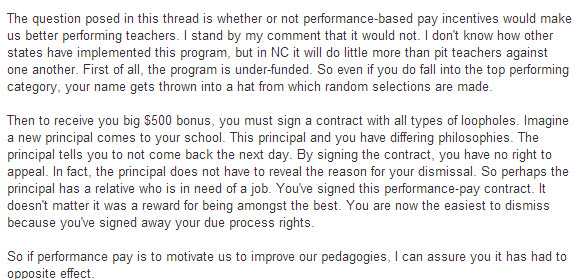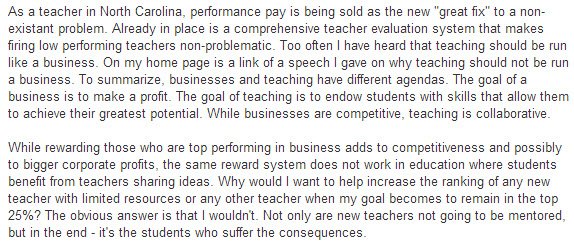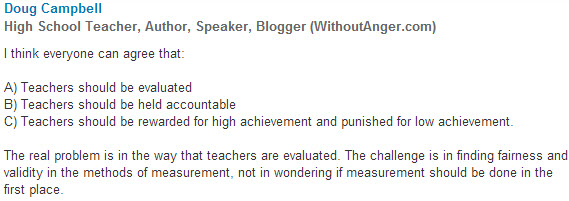The Potential Ugly Outcomes Of Teacher Pay For Performance
...continued from "Why Teacher Pay For Performance Doesn't, and can't Work
Q: Robert, in our previous talk, you suggested that pay for teacher performance doesn't work, because it doesn't really address the problems facing schools and teachers. In that you suggested that the problem isn't that teachers are lazy, and unmotivated, so providing incentives to, in effect, work harder doesn't work.
But couldn't we try it anyway. Maybe it would work. Or are there negatives attached to pay for performance that could actually impact, and cause kids to get a worse education?
Robert: I wouldn't go so far as to say bonuses for teachers would cause kids to get a worse education. I think it's possible that can happen because of the potential negative impact of reward systems for teachers, particularly since I think they are almost impossible to set up PROPERLY, but I wouldn't make the claim that bonuses damage outcomes or student learning without more evidence, and I don't have that evidence.
Q: But you do believe there's risk? And that there are negative outcomes possible?
Robert: Yes. I do. There are always risks when money gets put on the table, that people, in actually trying to win the prize, won't do the things we hope they'll do. It applies in a number of fields. Athletes cheat to win. Students cheat for the grade. Shortcuts happen all the time, particularly if you make rewards big enough. But still, most people aren't cheaters, and even given the possiblity of getting bonuses, they aren't going to cheat per se.
The biggest impact is not so much in terms of cheating, but that introducing rewards will change schools, the relationships between teachers and teachers an teachers and students. Rewards, let's say, based on a class' academic performance, shift the focus away from students as individual kids, and onto looking at kids and their performance as a "meal ticket". It can be a weird thing.
But you know what, let's do things a bit differently here. Rather than having me go through these and some of the other concerns, how about if we draw upon comments from others, and in particular teachers on the "firing line". I'll read them out, the ones I think are most telling, and then we'll put them in the transcript.
Q: OK. Fire away.
Robert: Here's one of the most telling I think. It's from a teacher IN a school division that already has a pay for performance system for its teachers. It's pretty startling. It's from Carly, a 3rd grade teacher.

Robert: There's a few things of which to take notice. First, what jumps out is the SPECIFICS of the problem -- being underfunded, having a random draw to determine who wins among the best performing nominees, the low level of the bonus ($500), and finally that to be eligible, one has to give up due process.
Q: But can it be done better in the details?
Robert: Sure it can. But practically speaking, there IS no money to allocate. School boards are strapped, and the only way this works financially is if you lower base salaries, which are often too low now, and then have a bonus system with much more money on the table for teachers.
Q: What do you think about Carly's comment about pitting teacher against teacher?
Robert: It's a valid one. And the more money at stake - when you reward people relative to each other and allow to win by 1) being better, 2) causing others in the competition to do worse, or both, you start rewarding people for the wrong behaviors. It IS a concern, but here's another quote from Carly:

Robert: The question of teachers supporting each other is critical in schools. As it stands now, it's hard fo teachers to find the time from their direct teaching responsibilities to help each other, mentor, share materials, or even ask each other relevant educational questions. Putting teachers in competition with each other, particularly when time is at such a premium, is probably going to lessen the quality of the professional and helping relationships.
Q: Other issues, Robert?
Robert: Yes. How do you develop and use a teacher evaluation system that is valid enough, objective enough, fair enough, and risk free enough to use to determine how much food a teacher can put on the table? Evaluation approaches that are used to develop teachers are different than the evaluation approaches that are needed to determine pay. So, as high school teacher Doug says:

Robert: The devil is in the details, and since teachers start each year unequal in terms of their "raw materials" (the students), test scores, even improvement scores are not a fair measure of how effective teachers have been. It might be possible to develop a set of complicated criteria to use and apply to evaluate and reward teachers, but as is the case with many things, to do it PROPERLY would be prohibitively expensive and end up pulling money out of things that directly benefit students.
Q: Anything else you want to add before we wrap up?
Robert: Yes. We've been talking, but you know, we haven't actually scratched the surface of the topic, the things that go wrong. That would take a whole book, I think. But coupled with the idea we talked about in our previous session, that money rewards can ONLY act as incentives to work harder, and that problems in schools are not the result of lazy teachers, it doesn't seem like a good investment to me.
But let's wrap up with the following, from Robert (another one):

The quotes included are part of the discussion on Teacher's Lounge on LinkedIn available here.
 Now Available in
Now Available in 